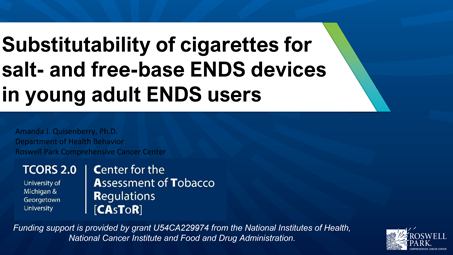“Substitutability of cigarettes for salt- and free-based ENDS devices in young adult ENDS users” with Dr. Amanda Quisenberry (Roswell Park Comprehensive Cancer Center)
- Contact the presenter
- Dr. Amanda Quisenberry <amanda.quisenberry@roswellpark.org>
- View Abstract +
- The recent increase in electronic nicotine delivery systems (ENDS) use among youth and young adults and associated nicotine dependence may increase the risk for uptake of other tobacco products in this population. We must understand both the conditions in which young users of ENDS may switch to using cigarettes, which are more toxic, and the associated regulatory efforts that may curb these transitions to protect the health of these young people. This study aimed to identify: 1) the actions of ENDS salt-base nicotine users when their ENDS device increases in price and 2) if menthol cigarettes are stronger substitutes than non-menthol cigarettes. Participants (n=9) were endowed with an account balance based on their baseline intake of tobacco products for use in an online purchasing analog called the Experimental Tobacco Marketplace (ETM). The ETM included a variety of tobacco products, including menthol and non-menthol cigarettes, available for purchase at constant prices while the price of the participants’ ENDS product increased (¼ market price (MP), ½ MP, MP, 2X MP, and 4X MP). All participants have been salt-based young adult users of ENDS. Preliminary ETM findings with nine participants show a decrease in purchasing of their ENDS product as price increased. Their average number of ENDS product purchases were 3.1 at ¼ MP, 1.5 at ½ MP, 1.5 at MP, 1 at 2X MP, and 0.5 at 4X MP. They, however, did not choose to substitute with cigarettes, either menthol or non-menthol. Only three of the participants selected any alternative products no matter the price of their ENDS product. One of those participants chose to substitute with IQOS smooth menthol heat sticks at 2X and 4X the MP for their ENDS product, another chose to substitute smooth menthol and tobacco IQOS at ½ - 2X MP, and the third chose to substitute On! mint flavor at 4X market price for their ENDS product. These substitution results could suggest that the menthol and mint flavoring is an appealing factor related to choice of alternative tobacco products among current users. Results should be interpreted cautiously given that only nine participants have completed the study. Recruitment is ongoing.
- View Bio +
- Amanda J. Quisenberry, Ph.D., is a tobacco regulatory science researcher who incorporates behavioral economics into the experimental methodology used in her research. She is trained in experimental psychology, behavior analysis, behavioral economics, and tobacco regulatory science. She currently holds a FDA CTP funded R01 investigating the effects of cigarillo flavor removal from the marketplace among young adult cigarillo users. This R01 has received 2 supplemental grants, which include expanding the sample to include sexual and gender minority women and investigating cigarillo co-use with cannabis. She was previously awarded an FDA CTP funded R03 investigating the effects of cigarette and e-cigarette flavor removal from the marketplace among menthol smokers. In addition to these two federally funded awards, she has received four pilot project awards, through both internal and external funding sources. Dr. Quisenberry aims to evaluate tobacco policy interventions, prior to implementation, to assess their impact on consumption and purchasing with the ultimate goal of informing regulators and other stakeholders about these interventions in hopes of decreasing cancer incidence among those most at risk.
 Dr. Amanda QuisenberryRoswell Park Comprehensive Cancer Center
Dr. Amanda QuisenberryRoswell Park Comprehensive Cancer Center
